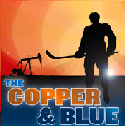Thomas Welsh - The Road Less Traveled
TSR Features, TSR Interviews | 14 Oct 2011Welsh made an unconventional decision to leave AAA hockey in Canada in favour of prep school south of the boarder.
When Penn State University announced it was going to join Division I NCAA hockey, fans in Happy Valley were given a reason to get excited. Finally the Penn State Icers will be given the chance to compete in the Frozen Four for the first time ever. In large part to Terry Pegula (the new owner of the Buffalo Sabres and Pennsylvania native), Penn State hockey will be put on the map - slowly but surely. At the helm sits former Princeton and Alaska head coach, Guy Gadowsky who plans to lead the charge for the Icers come 2012-13. PSU’s inaugural season will be played as an independent team, but will transfer to the Big 10 Conference the following year. Just in time for one of the best ’95 defensemen to hit the college scene.
Talk of possible recruits is beginning to blossom in Western Pennsylvania, but for some unexplained reason Toronto, Ontario native, Thomas Welsh hasn’t been getting enough of that talk. The 16-year-old defenseman who left Canada to play Prep School hockey for Salisbury hasn’t really gotten a fair shake until now. It is every Canadian kid’s dream to grow up, play in a top junior league (most notably the CHL) and get drafted to an NHL team. With the CHL developing more and more NHL-ready prospects, to leave that opportunity might be deemed as “career suicide” by many; and rightfully so.
Given his background and the team he was playing for in the GTHL, most players wouldn’t even consider hopping the border to play for a Prep team when an OHL career was an arms length away. Welsh was apart of one of the biggest powerhouse teams the GTHL has ever put out on the ice, the 1995 Don Mills Flyers. That season, the Flyers pushed their way to the AAA Provincial Ontario Championships and eventually won the event. During the 2011 OHL Priority Selection, three players were selected from the Flyers in the 1st round - Darnell Nurse, Max Domi and Adam Bateman. In total, 12 players were picked over the 15 rounds. So why would anyone choose to play in, what some would claim, an “inferior league”?
It is easy to knock a players decision before understanding the reasoning behind it. Thomas Welsh has been asked this question numerous times by his fellow peers and coaches in Canada. He’s been prodded and (in the extreme case) ridiculed enough to last him several hockey careers. However, Thomas Welsh isn’t like many top prospects that you might find as you dig through the Bantam/Minor Midget/Prep School ranks of the hockey world. Welsh knows the skills he possesses, what he can bring to the table each and every game, his worth the team (and the team to him), along with what he wants out of his life and his career. So making the transition to Prep School was not as big a “leap of faith” as many would be inclined to believe.
I was fortunate enough to get down to the nitty gritty on the type of player and person Penn State hockey fans will be watching in the coming years.
Shawn Reznik: Why did you choose to leave the GTHL for Prep School hockey here in the States?
Thomas Welsh: That was a tough decision. I was playing for the Don Mills Flyer AAA Bantam team and we had just won the AAA Provincial Ontario Bantam Championships. I had an amazing tournament, finishing 11th overall in points (which included forwards) and lead all the defense players in stats, being #1 in defense (GP 6 G4 A2 GWG2).
I had also just completed the U16 Prospects Tournament in Kitchener, Ontario (2010) from which a team was going to be finalized as Team Ontario U16. Again I had an amazing tournament, winning the MVP title in the championship game although our team lost. The feedback that I had received from scouts, and hockey personnel was extremely positive.
So my parents and I looked at what would be the next player development step. Playing Minor Midget AAA for the Don Mills Flyer, or USA Prep School. We had considered USHL or the AAA Mid FairField Blues National USA team, but there is a rule with Hockey Canada that will not allow or release a Canadian hockey player to play in the USA unless they reside with their parents. So this ruled out playing in the USHL, which we were strongly considering.
In the end we chose Div. 1 Salisbury Prep Varsity Hockey USA, CT as I was 15 years of age and would be competing against and with players that are 19 years of age on average. The coaching staff usually at the Div. 1 schools have coached USA College hockey or are ex-pro players. The Founder’s League is the toughest Div. 1 league to play in, it is a well scouted league by Colleges, NHL, USHL, and by OHL teams. Although the Prep season is a shorter number of games you have the ability to play in the Western New England Prep League, and the quality of the school and league provides you with the development necessary.
Being at the school gives you a controlled environment to learn academics and to strive in that situation. It gives you the skills necessary for billeting, eating healthy and learning time management skills. It also allows a player that is a dual athlete to play in multitude sports. I played not only Varsity Hockey but Varsity Football the team went undefeated (9-0) winning the New England Bowl and being a rookie rower I quickly advanced through the ranks to land on the Varsity 2nd Boat for my spring sport.
SR: What kind of reaction did you get from teammates and coaches?
TW: Both groups felt that it would not be a beneficial move at that time. You have to remember the Don Mills Flyers had won the AAA Provincial Championships that year and I was also at the U16 Prospect Tournament. It was at the end of that tournament weekend that my parents informed the Don Mills Flyers that I would not be returning. Yes the team was ticked off and I had negative comments which I was surprised to hear from former teammates. My parents received the same from the coach and manager. The criticism from my teammates on Facebook was hurtful. I expected the coaching staff to be negative but was a bit surprised since he came from a successful NCAA background.
In the end you can’t be worried about what critics say. You have to do your own thing and what is right for you. I know that I am a top player evidenced by scouting reports, feedback received from hockey personnel and by my stats and performance as a player. I choose not to look at my next year of development but 4 years down the road. The Don Mills Flyers would have been only a 1 year plan, and here its a year later.
I would think that today my coaches would agree with the decision I made.
SR: How has Salisbury helped you to develop your game?
TW: The speed of the game and the techniques for playing against/with players older makes you develop faster. The coaching is disciplined and serious because the guys are “hockey skilled”, which means the team can take it to another level in their practices. You get better as there are no “routine games” as the prep league is extremely competitive, every game is like a tourney game. A 10th place Prep team, can win against the 1st place Prep team on any given day.
Where in the GTHL you play against players your same age and with teams that have been formed two or threes prior with minimal player movement, and the standings between the teams usually remains the same and the game outcomes are very similar. There is minimal team movement amongst the standings and as a result and this limits your development. So ask yourself, where is the challenge?
My development has obviously progressed as I was rated a AA player in the OHL entry draft, but as Sarnia’s head scout Mr. Dedenhem put it, “flew under the radar” being in the USA and therefore allowed Sarnia to pick me in the OHL 5th round.
I also bypassed the regional selection camps and went right to the final selection camp for U17 Team Ontario, Thunder Bay in July (2011). The feedback received from the scouts, hockey personnel and OHL teams including Sarnia has been very positive. Troy Smith (assistant coach Kitchener Rangers) will be the head coach with team roster to be finalized in November 2011. My ability to contribute to this team would be my desire and I would hope that they would see it as a benefit as I would like a chance to compete at this level.
SR: What are your expectations this season for yourself and for the team?
TW: I am looking at increasing my development as player, hopefully taking on a leadership role. I learned a lot of new skills from my Coach, Andrew Will, and look forward to applying these skills in the game. Increasing my overall game play, speed of the game, physicality, and determination. Salisbury was in a re-building phase last year and for this year. However with the returning players and the new additions, my expectations are that we should be a contender for the Div. 1 Championship. Our season last year was very good, although leading in the semi-finals we lost to the championship team, even though we had previously won against them in league play.
SR: Have you given any consideration to playing in the USHL next season to get more exposure for your draft year?
TW: I am open to my options and look at things yearly and as they come. Always thinking about developing as a player and what are the necessary steps to achieving those goals with one day playing in the NHL. I have been contacted by many of these teams and competed last year in the USHL combine in Chicago 2011. The feedback received from the Combine was extremely positive and my showing indicated this (GP 5 G4 A4). One of the advantages of playing in the USHL is that it is considered semi-pro league and leaves your NCAA eligibility intact, as well as being well scouted.
SR: What were some of the colleges you were looking to go to?
TW: I had done my due diligence with touring. I visited Boston U, North Eastern, Harvard, Yale, Quinnipiac, Cornell, University of Miami Ohio, Vermont, Penn State, and Michigan.
SR: Why did you ultimately decided on Penn State?
TW: Penn State suited me the best. My family and I had gone to Penn State in September of this year, staying for a few days. We toured the city, campus, met with Head Coach Gadowsky and Assistant Coach Matt Lindsay, took in an Exhibition Football game and participated in the pre-game football pep rally. Penn State has a tremendous Business program with a long-standing tradition as a top school. Looking at the programs offered with the combination of a great hockey program, it was the right fit and I felt a connection.
SR: Do you believe playing for a brand new D-1 team will help you more than playing for an already established D-1 team?
TW: Although 2013 will be the year that Penn State becomes part of the Big 10 Conference and moves to a D-1 team, I feel that the coaching staff and the men’s hockey program will benefit me. The coaching reputation speaks for itself, and with Coach Gadowsky and Coach Lindsay bringing me there in 2013, it shows that they have a high confidence level in me as a player and feel that I will be a contributor to the team.
SR: What are the advantages and disadvantages of playing NCAA vs. CHL?
TW: OHL has a lot to offer. During my year at Salisbury, many of the OHL teams came to monitor my development including the Director of Central Ontario Scouting, Rob Kitamura. Because of my AA rating I did visit many OHL teams meeting with the coaches, trainers, owners and school advisors. OHL has a lot to offer in hockey development. They provide an educational incentive but with strings attached. You most likely have to change high schools, will not be able to do a full academic course load, and will billet with families and the OHL voids any future scholarships thru NCAA.
NCAA offers scholarships to top Div 1 schools, player development with the possibility to going pro. It is a well scouted. Gives you an education to a top College, rich in long standing traditions, unique to those Div 1 schools. It’s a “brother hood”, atmosphere. You get crazy, spirit fanned students and the band supporting you at your games, rocking the house. It provides the best blend of hockey development and academics for me. I think that every individual needs to find the right fit for them. For some it’s the OHL. For others it’s the NCAA. There really is no right answer to which league offers the best. It’s an individual thing.
SR: Describe yourself as a player in a few short sentences.
TW: I am a well skilled defensive player, that can play a two way game (offensive and defensive), that sees the ice well. Poised and have a good outlet pass. I like to play with an edge and bring a physical element to the game, and have a hard and accurate slap shot from the point.
SR: What is the best part about playing your position?
TW: Forcing my opponent to be aware of me when I am out on the ice. Having them adjust to my game and not the other way around.
SR: Besides what scouts/coaches/GM’s can see from you on the ice, what is something else they may not know about Thomas Welsh?
TW: I have a black belt in Karate and train in mix martial arts. I competed 7 years in the National Black Belt League winning many division titles before pursuing hockey in a more competitive nature. That when I put my mind to something I “do it”. That I am a well rounded athlete playing and succeeding in multitude sports (football, rowing, cross country…)
I enjoy “giving back” to society. I volunteer in many programs when home from school. Volunteer my time regularly (10 hours/week) at ON ICE GOAL TENDING, and help coach young goaltenders that are pursuing their dream of playing hockey, fund raising for Ronald McDonald House, Canadian Cancer, and other community programs.
Now those are some pretty powerful words for a kid who is still only a junior in high school. But that’s Thomas Welsh: what you see is what you get. He is as complete a player as he is an individual. To him, an education is as important - if not more so - than a career in hockey. He’s a grounded student brought up in a household of strong morals. And if it hasn’t become self-evident, Tom won’t side with the majority for majority’s sake. He weighs his options to see what fits best for him. It’s a virtue that has been skipped over by too many.
This offseason, the USHL and NCAA saw commitments like Connor Murphy, Reid Boucher, and John Gibson ditch their NCAA eligibility to build their careers in the OHL. Although the Sarnia Sting hold Welsh’s rights, Tom is of a different ilk that doesn’t seem to want to stray away from an top college education, paired with a newly developed hockey program.
Since joining Salisbury last year, Welsh has established himself as one of the best two-way defensemen on the team, routinely outplaying kids four years older than him. For many, that seems like a difficult accomplishment. Thomas Welsh views it as just another step towards his development. For all the flack that Tom received for leaving the GTHL in the first place, he has proved the naysayers wrong with his play for Salisbury Prep.
Penn State has to wait two more years before Thomas Welsh makes his debut, but the coaches and fans will realize after the first few shifts how big a staple Welsh will be for the Icers backend.
Get ready Happy Valley. You guys snagged a good one.
Tags: 2013 Draft, Big 10 Conference, Don Mills Flyers, Penn State University, Thomas Welsh




Great interview!! Congrats to Mr Reznik for a really interesting and thorough interview. I’ve followed TSR from the start and am never disappointed with your material and continuously impressed with your professionalism. Keep up the great work. Thank you.